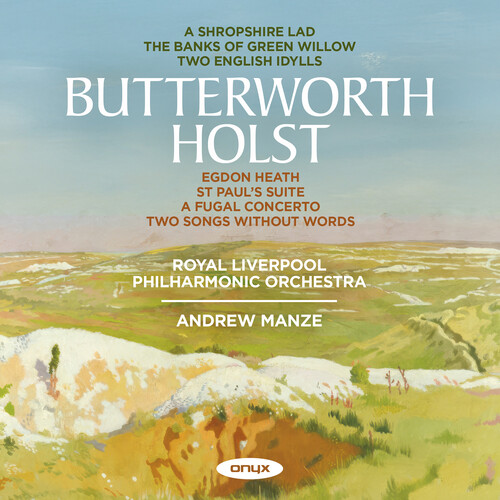Show results for
Deals
- 4K Ultra HD Sale
- Action Sale
- Alternative Rock Sale
- Anime sale
- Award Winners Sale
- Bear Family Sale
- Blu ray Sale
- Blues on Sale
- British Sale
- Classical Music Sale
- Comedy Music Sale
- Comedy Sale
- Country Sale
- Criterion Sale
- Drama Sale
- Electronic Music sale
- Golden Age of Hollywood sale
- Horror Sci fi Sale
- Kids and Family Sale
- Metal Sale
- Music Video Sale
- Musicals on Sale
- Mystery Sale
- Naxos Label Sale
- Page to Screen Sale
- Paramount Sale
- PBS on Sale
- Rap and Hip Hop Sale
- Reggae Sale
- Rock
- Rock and Pop Sale
- Rock Legends
- Soul Music Sale
- TV Sale
- Vinyl on Sale
- War Films and Westerns on Sale

Holst & Butterworth: A Shropshire Lad, Two Idylls, Banks of Green Will
- Format: CD
- Release Date: 10/10/2025

Holst & Butterworth: A Shropshire Lad, Two Idylls, Banks of Green Will
- Format: CD
- Release Date: 10/10/2025
- Label: Onyx Classics
- UPC: 880040425823
- Item #: 2737927X
- Genre: Classical Vocal Crossover
- Release Date: 10/10/2025
Product Notes
George Butterworth, one of the pre 1914 generation lost in the Great War, left a small but enduring body of work. He was introduced to folk music by Vaughan Williams, but he was also a dancer and collector of folk songs and dances - especially those from Sussex. It is however his A.E Houseman inspired orchestral rhapsody, A Shropshire Lad, that has become his most famous composition and seems to conjure up a powerful sense of the countryside of that county, and melancholy at the waste and futility of war. Holst, like Butterworth was a friend of Vaughan Williams, and together the two of them collected folk songs from around England. Holst also taught at the school for girls in Hammersmith, London and the St Paul Suite is a personal thank you to the school. Folk songs imbue the two Songs without Words. Holst became friendly with Thomas Hardy, and it was on a night walk (at the urging of Hardy) that the inspiration for Egdon Heath came to Holst. The 15-minute-long work capture the 'singularly colossal and mysterious in it's swarthy monotony' as Hardy described the area of moorland in his novel The Return of the Native. The high trumpet at the close of the work is surely sounding from post war sad shires.


